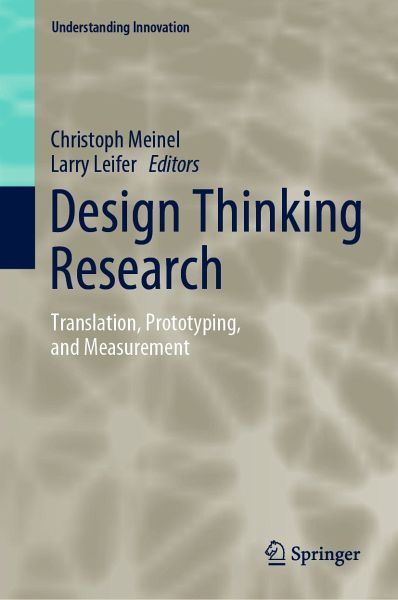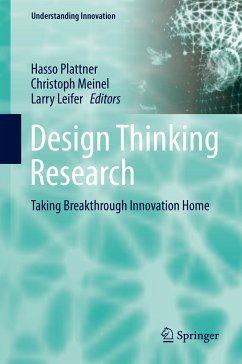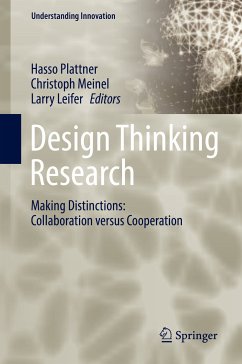
Design Thinking Research (eBook, PDF)
Translation, Prototyping, and Measurement
Redaktion: Meinel, Christoph; Leifer, Larry
Versandkostenfrei!
Sofort per Download lieferbar
136,95 €
inkl. MwSt.
Weitere Ausgaben:

PAYBACK Punkte
68 °P sammeln!
Extensive research conducted by the Hasso Plattner Design Thinking Research Program at Stanford University in Palo Alto, California, USA, and the Hasso Plattner Institute in Potsdam, Germany, has yielded valuable insights on why and how design thinking works. The participating researchers have identified metrics, developed models, and conducted studies, which are featured in this book, and in the previous volumes of this series.This volume provides readers with tools to bridge the gap between research and practice in design thinking with varied real world examples. Several different approaches...
Extensive research conducted by the Hasso Plattner Design Thinking Research Program at Stanford University in Palo Alto, California, USA, and the Hasso Plattner Institute in Potsdam, Germany, has yielded valuable insights on why and how design thinking works. The participating researchers have identified metrics, developed models, and conducted studies, which are featured in this book, and in the previous volumes of this series.
This volume provides readers with tools to bridge the gap between research and practice in design thinking with varied real world examples. Several different approaches to design thinking are presented in this volume. Acquired frameworks are leveraged to understand design thinking team dynamics. The contributing authors lead the reader through new approaches and application fields and show that design thinking can tap the potential of digital technologies in a human-centered way. In a final section, new ideas in neurodesign at Stanford University andat Hasso Plattner Institute in Potsdam are elaborated upon thereby challenging the reader to consider newly developed methodologies and provide discussion of how these insights can be applied to various sectors.
Special emphasis is placed on understanding the mechanisms underlying design thinking at the individual and team levels. Design thinking can be learned. It has a methodology that can be observed across multiple settings and accordingly, the reader can adopt new frameworks to modify and update existing practice. The research outcomes compiled in this book are intended to inform and provide inspiration for all those seeking to drive innovation - be they experienced design thinkers or newcomers.
This volume provides readers with tools to bridge the gap between research and practice in design thinking with varied real world examples. Several different approaches to design thinking are presented in this volume. Acquired frameworks are leveraged to understand design thinking team dynamics. The contributing authors lead the reader through new approaches and application fields and show that design thinking can tap the potential of digital technologies in a human-centered way. In a final section, new ideas in neurodesign at Stanford University andat Hasso Plattner Institute in Potsdam are elaborated upon thereby challenging the reader to consider newly developed methodologies and provide discussion of how these insights can be applied to various sectors.
Special emphasis is placed on understanding the mechanisms underlying design thinking at the individual and team levels. Design thinking can be learned. It has a methodology that can be observed across multiple settings and accordingly, the reader can adopt new frameworks to modify and update existing practice. The research outcomes compiled in this book are intended to inform and provide inspiration for all those seeking to drive innovation - be they experienced design thinkers or newcomers.
Dieser Download kann aus rechtlichen Gründen nur mit Rechnungsadresse in A, B, BG, CY, CZ, D, DK, EW, E, FIN, F, GR, HR, H, IRL, I, LT, L, LR, M, NL, PL, P, R, S, SLO, SK ausgeliefert werden.












